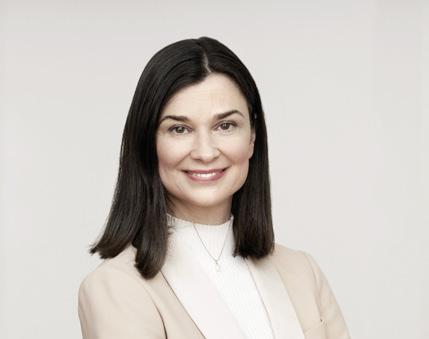
4 minute read
Editorial
A strong partner network promoting innovative climate change education in science and technology education
By Dr. Nina Smidt
Advertisement
Dr. Nina Smidt is the Managing Director and spokesperson of the Siemens Stiftung Board of Directors. Her primary responsibilities on the Board of Directors are concerned with the foundation’s work in the areas of education and culture.
Together with its partners, Siemens Stiftung promotes sustainable social development around the globe. In Latin America, as in Germany and Africa, our emphasis is on educational projects focusing on STEM subjects. This acronym, which stands for Science, Technology, Engineering and Mathematics, has now become standard in the international education debate and is at the core of our work on several continents. A sound basic education in the fields of science and mathematics geared to acquiring digital skills opens up children’s minds to deal with complex interdependencies. In adult life, knowledge of these subjects correlates with active engagement in local and global issues and a willingness to take responsibility for social processes. STEM skills are, therefore, a vital element in a holistic education that promotes cooperation, communication and creativity.
Climate change amplifies political crises and issues concerning society as a whole
It is becoming increasingly clear that the gulf between rich and poor will widen even further in the coming decades, which will see many millions of people slip below the poverty line. One of the greatest challenges facing us, including in South America, is climate change, which is progressing much faster than previously thought. The 1.5°C threshold will likely be exceeded within the coming decade – with vast and incalculable implications. Droughts, flooding and other consequences of climate change will force many people to abandon their homelands. Migration flows will increase, particularly from rural to urban areas, but also far across national boundaries. The risks of social upheaval are tremendous. While scientific and technical knowledge can help people to develop a capacity to adapt to the shifting natural circumstances around them, the issues at hand have far greater and wide-reaching impact. Societies as a whole must evolve in order to better comprehend the problems associated with climate change and find ways to reduce their vulnerability, become more resilient, and practice solidarity with those who are most severely impacted. The worlds of politics, business and civil society must converge and cooperate. A systemic approach is calleed for that can only be achieved through education.
Climate change education as a sustainable climate adaptation strategy
Siemens Stiftung has been active in Latin America for a decade. Given the extreme urgency of climate change issues, we have joined forces with our Latin American partners in order to develop concepts and materials for climate change education and, by working together, anchor the topic in regional and location-specific. In addition to coordinating a growing network of partner institutions across eight Latin American counties, our regional office in Chile is also working to launch and merge project lines in STEM subjects with a particular focus on sustainable development. In future, we will also cooperate even more closely with UNESCO’s Latin American office in every area of our activities. Our collaboration with UNESCO is a source of great pride for Siemens Stiftung. Developing teaching content for climate change education is a particularly complex area of STEM education. Hardly any other topic requires such an extensively interconnected and networked knowledge of science, mathematics and technology. At the same time, political institutions and social groups at all levels of society need to be made aware of the entire spectrum of climate change issues. We need to investigate and explain the interactions between the manifold impacts of climate change and work towards structuring and organizing social resilience as an act of solidarity with those who are most severely impacted by climate change. Consequently, climate change education must inevitably be multidisciplinary. It is not only a climate protection strategy, but also a strategy promoting sustainable climate adaptation across entire social systems.
Solution-oriented teaching for a climateconscious lifestyle
The Potsdam Institute for Climate Impact Research (PIK) has identified six social tipping interventions (STIs)1 that will enable us to turn the tide of climate change, one of which is “strengthening climate education and engagement with climate issues”. As the study goes on to state, “sustainability cannot be imposed, it has to be learned.” Consequently, the authors advocate integrating an environmentally aware and climate-conscious lifestyle much more deeply in school education than is currently the case. High-quality education, the researchers emphasize, promotes standards and values and can achieve rapid changes in how individuals behave and interact with their surroundings. Developing this high-quality education is precisely our mission at Siemens Stiftung. Beyond their topical relevance, the materials developed in our
partner network also feature innovative teaching methods. In providing further training for teachers, we place an emphasis on encouraging children and young people to experiment and discuss ideas; taking children out of the classroom and guiding them through their environment facilitates active learning based on their own context. Our goal is to promote project-based, solution-oriented learning, which we perceive as the only way to empower young people to master the climate crisis.
1Social tipping dynamics for stabilizing Earth’s climate by 2050. Otto, I.M., Donges, J.F., Cremades, R., Bhowmik, A., Hewitt, R.J. et.al. In: Proceedings of the National Academy of Sciences, January 2020









